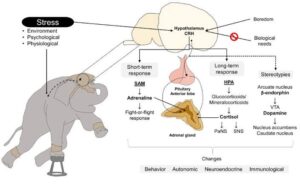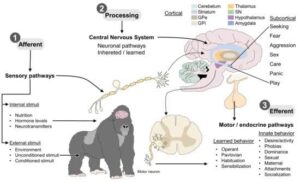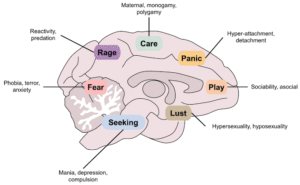Back to: ZOOLOGY 400 Level
Welcome to class!
Hello my brilliant friend! It’s always a joy to learn with you. Today’s topic is one that connects very closely to both animals and even us humans—Stress Responses. Ever felt tense before an exam or nervous before speaking in public? That’s your body reacting to stress! Animals go through the same thing in the wild. Let’s understand what stress really means and how the body handles it.
Stress Responses
What is Stress?
Stress is the body’s natural way of responding to a challenge or threat. It can be physical, like escaping a predator, or emotional, like feeling anxious or scared. In animals (including humans), stress is not always a bad thing—it helps the body prepare to respond quickly and effectively. But when it lasts too long, it can become harmful.

Types of Stress Responses
Acute Stress Response
This is the body’s immediate reaction to a sudden threat. It’s often called the “fight or flight” response. When an animal (or person) senses danger, the body quickly prepares to either face the threat or run away from it.
How it Works:
The brain detects danger and sends a signal to the adrenal glands. These glands release a hormone called adrenaline (epinephrine), which causes:
Faster heartbeat
Rapid breathing
Increased energy
Sharper focus
Example: If a bushbaby spots a snake nearby, its body instantly prepares to jump away, with its heart racing and muscles ready for action.
Chronic Stress Response
This happens when the stressful situation doesn’t go away quickly. Instead of a short burst, the stress lasts for a longer time. In such cases, the hormone cortisol is released to help the body cope.
How it Works:
Cortisol helps maintain steady energy and blood pressure over time. However, if stress remains for too long, cortisol can weaken the immune system, cause tiredness, and affect learning or growth.
Example: An animal living in a habitat that is constantly disturbed by humans or predators may stay alert and anxious for weeks. This long-term stress affects its health and ability to reproduce.

Physiological Changes During Stress
Heart Rate Increases: The body pumps more blood to muscles to prepare for action.
Breathing Becomes Rapid: More oxygen is needed for quick thinking and movement.
Digestive System Slows Down: The body focuses on survival instead of processing food.
Muscles Tighten: To get ready for quick movements.
Pupils Dilate: To see better in case of danger.
These changes help animals react fast in emergency situations. But they are only helpful in short bursts.
Behavioural Responses to Stress
Animals also show changes in behaviour when stressed:
Hiding or running away
Shaking or pacing
Increased aggression
Making alarm calls
Humans may bite nails, fidget, or feel restless when stressed.
Why Understanding Stress is Important

Understanding stress helps us care better for ourselves, other people, and animals. In veterinary care, zookeeping, farming, or wildlife conservation, recognising signs of stress helps improve animal welfare. In our own lives, it reminds us to take breaks, rest, and take care of our mental and emotional health.
Summary
- Stress is the body’s reaction to a challenge or threat, and it can be short-term (acute) or long-term (chronic).
- The acute stress response involves adrenaline and prepares the body for “fight or flight.”
- The chronic stress response involves cortisol and occurs when stress lasts for a long time.
- Physiological changes during stress include increased heart rate, breathing, and muscle tension.
- Recognising stress responses helps improve animal care and teaches us how to manage our own wellbeing.
Evaluation
- What is stress and why does the body respond to it?
- Differentiate between acute and chronic stress with examples.
- Which hormones are involved in stress responses, and what do they do?
- List three physiological changes that happen during stress.
- Why is it important to recognise stress in animals and humans?
You’re doing an amazing job! Learning how the body reacts to stress is such a powerful tool—not just for your exams but also for life. Keep pushing forward with confidence and curiosity. At Afrilearn, we believe in you, and we can’t wait to see you shine in the next lesson!
